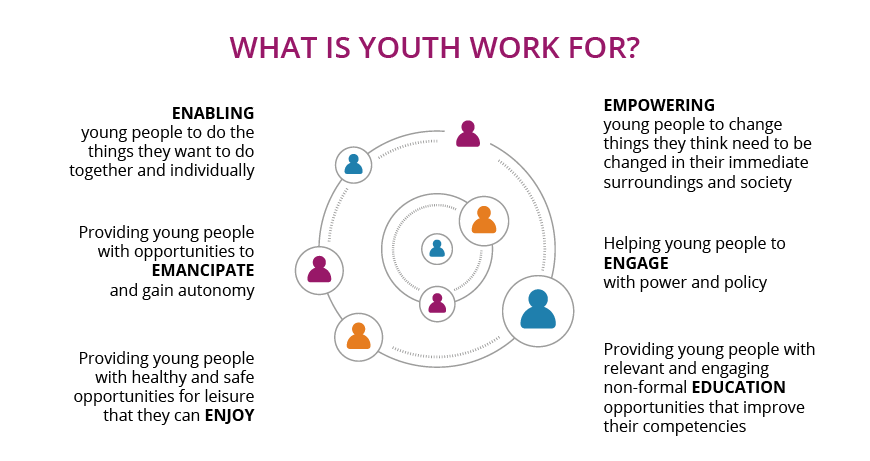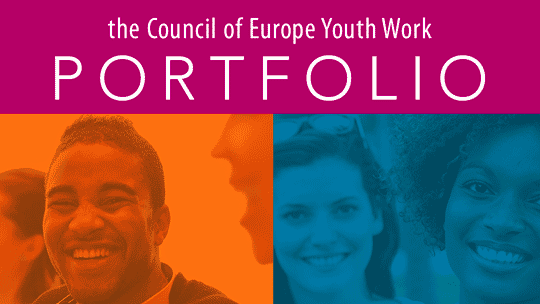Youth work essentials
Here you can find some basic information about what youth work is, about its main characteristics and approaches, as well as about how it links up with society and public policy.
This information may be helpful when you start using the Portfolio
What is youth work?
Youth work is commonly understood as a tool for personal development, social integration and active citizenship of young people. Youth work is a ‘keyword’ for all kinds of activities with, for and by young people of a social, cultural, educational or political nature. It belongs to the domain of 'out-of-school’ education, most commonly referred to as either non-formal or informal learning. The main objective of youth work is to create opportunities for young people to shape their own futures.
The range of themes that youth work covers is just as diverse as the types of people and organisations involved. Political activism, street work, sports activities, social enterprise and leisure-time activities can all be termed ‘youth work’.

Have a look at some youth work examples:

Youth work characteristics
Youth work usually has the following characteristics
- Value-driven: youth work tries to serve the higher purposes of inclusion and social cohesion
- Youth-centric: youth work serves key needs and aspirations of youth, identified by young people themselves
- Voluntary: youth work is not obligatory, and relies on the voluntary participation of young people
- Developmental: youth work aims at the personal, social and ethical development of young people
- Self-reflective and critical: youth work tries to make sure it is doing its best to live up to its mission
- Relational: youth work seeks authentic communication with young people and to contribute to sustaining viable communities.
Youth work is diverse around Europe
Youth work around Europe is conducted by a large number of different institutions and organisations and by many different people, individually and in teams. It is very diverse, taking many different forms. Some countries have long traditions of professional youth work (qualified staff working with young people through local and national authority-funded programmes and institutions). Other countries have long-established voluntary youth work structures (activities provided by voluntary organisations). Other countries again have established youth work as part of social welfare provision, with youth work practices being put to the service of employability, social inclusion and social assistance. And, in some countries youth work takes place without the existence of a recognised “profession” of youth work, and the people doing youth work are volunteer leaders.
- What kind of youth work do you practice?
- Can you identify these features in your youth work? Which ones are most important for you?
- What are the aims of your youth work?
Youth work and non-formal education
Youth work often has a strong educational purpose or dimension. Typically, the education or learning that takes place in youth work is ‘non-formal’ – not ‘formal’ and not ‘informal’. Youth work and non-formal education have many characteristics in common. Nevertheless, they are not the same.
So, what are the characteristics of ‘non-formal’ education or learning?
|
In brief… |
|
|
Methodological features |
|
|
Values |
|
|
Non-formal educators … |
|
Youth work and youth policies
Youth work is also about the place of young people and their concerns in society and the public sphere. It is also about influencing society, politics and power relations, especially if those position young people at a disadvantage, marginalise them or exclude them.
- How do the realities of the young people you work with influence your work?
- How do you find out about the needs and concerns of young people?
- In what ways do politics and policy influence the way you do your work?
- How do you see your role in relation to the wider political and social context youth work takes place in?

The Council of Europe Youth Work Portfolio is a tool to help those doing youth work, primarily youth workers and youth leaders, but also managers and administrators, to assess and further develop their youth work competence and that of the people under their supervision.


